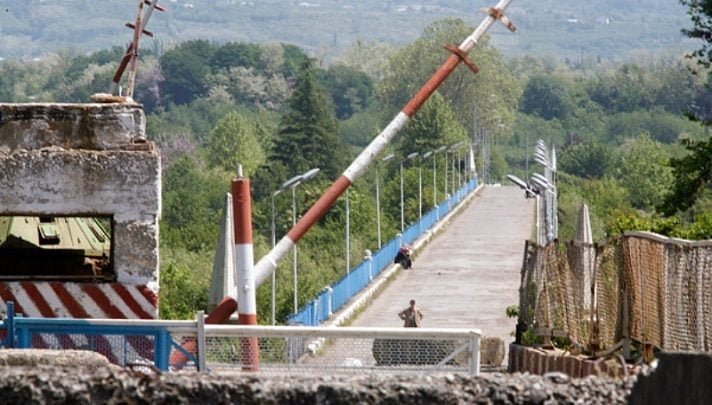
SJC Calls on Government to Review Policy on Abkhazia Following Bichvinta Land Transfer
On December 28, a local watchdog, the Social Justice Center (SJC), issued a statement on the ratification of agreement on transfer of occupied Bichvinta land to Russia by Abkhazia’s de-facto legislature, calling on the Georgian Government to systemically review its policy toward the occupied region.
On December 27, the de-facto Parliament of occupied Abkhazia ratified the agreement on the transfer of the Bichvinta (the so-called “Pitsunda state dacha”) to Russia for a 49-year lease (the residence and its dependencies cover the land plot of 4 sq. Km). Later the same day, the de facto President of Abkhazia, Aslan Bzhania, signed the ratification document. The decision was met with local demonstrations by the opponents of the land transfer.
According to the SJC, Russia is continuing its annexation of Georgian territory through the de-facto local government with the aim of “consolidating political, economic and military control over the territory of Abkhazia, appropriating local resources and strategic sites, and weakening democratic processes on the ground.” The watchdog warns that after the Bichvinta land transfer, Russia is likely to continue its practice of “absorbing natural resources and real estate in Abkhazia.” It adds that this policy could extend in the future to “the construction of thousands of aparthotels and the granting of property rights to Russian citizens” on occupied Georgian territory [Ed. – According to the ratified agreement, Russia is allowed to carry out any construction works on the land plot with the consent of the Abkhaz side. After the expiration of the lease agreement, Russia’s property rights to these constructions will not be suspended].
The SJC notes that the agreement “on the transfer of the state resort” was signed between the de-facto government of Abkhazia and Russia in January 2022 “without public consultations and democratic processes,” adding that the Abkhaz community became aware of this fact only in July 2022, when the so-called parliament started the necessary procedures to ratify the agreement. This has led many of Abkhazia residents to resist the transfer of land to Russia to this day.
“The Abkhaz society already for years shows resilience and resistance to defend its autonomy on the control of resources and not to allow the consequent appropriation of natural resources, real estate and strategic objects by Russia,” – the statement reads, adding that the Abkhaz society expects that the ongoing processes will have a negative political, demographic, social and environmental impact on their lives and future.
The statement notes that the ongoing processes in Abkhazia have created the ground for Georgian and Abkhaz societies to share their concerns, as the Abkhaz dissatisfaction with Russian annexation attempts only grows. In view of this reality, the SJC statement emphasizes that it is “unfortunate that the Georgian government does not have an obvious response policy that would, on the one hand, strengthen the interest and attention of the international society to the ongoing processes in the region of Abkhazia, and, on the other hand, offer the Abkhaz society peaceful alternatives that would meet its concerns about security, future and democratic development”. It adds that the Georgian Government should have used this momentum, the “transitional reality,” to implement the “bold peaceful policy” towards Abkhazia. It also stresses the importance of the EU candidate status recently granted to Georgia, noting that the European integration process can have a “significant impact on the conflict transformation process.”
The SJC says: “Unfortunately, the Government has not promoted the democratic process on these issues of national importance, which, through consultations with international actors, political parties and public organizations, would create the conditions for reviewing existing policies, generating new visions and possibilities, and achieving an internal social and political solution.” It therefore calls on the Georgian Government to take the following steps:
- Present to the Parliament and the society the political vision on how it intends to implement the international political, diplomatic and legal mechanisms in response to Russia’s continued policy of appropriation of natural resources, strategic sites and real estate in Abkhazia;
- Develop, through active consultation with international partners, civil society, IDPs and political parties, a conflict transformation peace policy that addresses the concerns and grievances of Abkhaz society, including offering new opportunities and prospects in the European integration process;
- Create an inclusive and political process on de-occupation and relations with Russia, involving international organizations, political and public groups, including IDPs that would promote the development of new political views and approaches, increase the accountability of state policy in this direction, and achieve a solution.
Also Read:
- 28/12/2023 – International Reactions to Transfer of Occupied Abkhazia’s Bichvinta Dacha to Russia
- 27/12/2023 – Reactions to Transfer of Occupied Abkhazia’s Bichvinta Dacha to Russia
This post is also available in: ქართული Русский